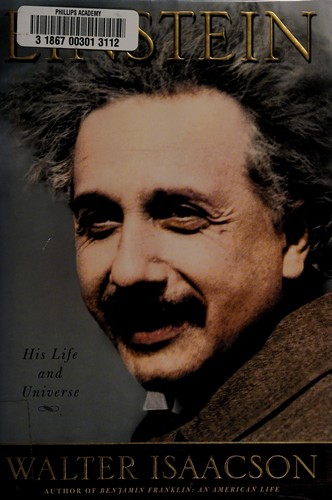His brilliance and, yes, his flaws
5 stars
Everything that has fascinated me about Einstein is here. Above all it's the wonder of his two breakthroughs on relativity. Stephen Hawking set me up nicely to enjoy Walter Isaacson's elegant summaries for the lay person. Relativity is for everyone!
Next, the philosophy and science issue. Isaacson doesn't pass definitive judgement, but he lays it out. Einstein's rejection of aspects of quantum theory was a flaw. It seemed to stem from his belief in "Spinoza’s God who reveals himself in the orderly harmony of what exists". That's OK, but when confronted with the evidence supporting quantum theory, Einstein's strict adherence to this pantheist position became like a dogma. It takes a strong, clear argument to make a convincing critique of Albert fucking Einstein, but Isaacson does it.
I only take off half a star because early on Isaacson declares that Einstein "believed in god". You can't say it so baldly, …
Everything that has fascinated me about Einstein is here. Above all it's the wonder of his two breakthroughs on relativity. Stephen Hawking set me up nicely to enjoy Walter Isaacson's elegant summaries for the lay person. Relativity is for everyone!
Next, the philosophy and science issue. Isaacson doesn't pass definitive judgement, but he lays it out. Einstein's rejection of aspects of quantum theory was a flaw. It seemed to stem from his belief in "Spinoza’s God who reveals himself in the orderly harmony of what exists". That's OK, but when confronted with the evidence supporting quantum theory, Einstein's strict adherence to this pantheist position became like a dogma. It takes a strong, clear argument to make a convincing critique of Albert fucking Einstein, but Isaacson does it.
I only take off half a star because early on Isaacson declares that Einstein "believed in god". You can't say it so baldly, it's not that simple and it's unseemly when believers and atheists alike try to claim Einstein for their own. There's always an asterisk. Later in the book Isaacson does lay out the nuance in Einstein's position on god. I think Richard Dawkins did a better job, when he referred to pantheism as "sexed up atheism", while claiming Einstein for our team.
My admiration for Einstein grows when I read about his flexibility in other areas. He was a pacifist after the First World War, but he changed his position when the horror of Nazism became clear to him. Hitler forced that change. It was no longer a choice, the Nazis had to be stopped. This in turn led to him supporting the US nuclear weapons program, to counter the possibility of Hitler getting there first. When nuclear proliferation grew into the nightmare of mutually assured destruction, Einstein joined those warning about the suicidal threat nuclear weapons pose to human civilization.
It is not a given that moral clarity will follow scientific brilliance. Einstein was not perfect, but this biography shows he shone brilliantly in both magisteria.

